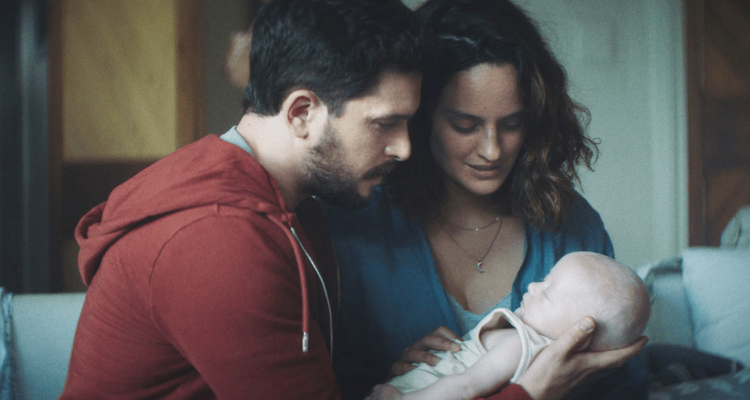Motherhood is scary as hell. The exhaustion, the changes in the body, the responsibility for an entirely new life; all take a heavy toll on new mothers. It also makes the experience rife for exploration through the genre machinations of psychological and body horror. With her feature film debut, “Baby Ruby,” playwright Bess Wohl uses both genres to explore postpartum depression.
Noémie Merlant (“Portrait of a Lady on Fire”) stars as Jo, a wealthy vlogger and lifestyle influencer who is expecting her first child with her husband Spencer (Kit Harington), an ethical butcher. The two live together in an idyllic designer home surrounded by a verdant forest. Jo thrives in the way that social media allows her to control every aspect of how she presents her life to others. She once “broke the internet” with her sublime soufflé recipe. But, after documenting her way through her entire pregnancy, things take a drastic turn after the birth of her daughter – the titular baby Ruby.
READ MORE: TIFF 2022: 16 Must-See Films To See At The Toronto Film Festival
At first, Wohl’s film finds horror in the ordinary parts of the birthing process, from Jo’s blood-soaked post-birth underwear to a cranky nurse demanding she has a bowel movement before she can leave the hospital with her new family. The pregnancy and post-pregnancy body itself is a horror. Blood and feces and placentas you can take home and bake into a casserole. As the sleepless nights of new motherhood take their toll on Jo, doubts begin to creep into her mind about her ability to be a good mother.
Early in the film, a weird interaction with fellow local super mother Shelly (Meredith Hagner, delightfully dippy) puts Jo ill at ease, and it always lingers in the back of her mind. Feeling like a failure as Ruby screams through the night and fusses endlessly while alone with her, Jo is unable to share the birth with her social media followers and continually compares herself to Shelly, who seems to have all the perfect maternal instincts that Jo lacks.
Slowly, Jo begins to lose her grasp on reality, imagining the most horrible ways she might accidentally – or purposefully – harm or even kill her child. During an appointment with a pediatrician (an always excellent Reed Birney), she asks if the baby could be disappointed in her. He laughs it off; after all, Ruby’s a baby, too young to be disappointed in anything yet. But Jo can’t shake the feeling that her baby hates her, that her crying is a targeted attack.
READ MORE: Fall 2022 Preview: 60+ Must-See Films To Watch
Jo gets no help from her husband, and Harrington here is either perfectly cast because Spencer is a real nonstarter or completely miscast because he barely does anything. He does have one great scene: after spending the night sleeping in a parking lot instead of going to mom drinks—or maybe after mom drinks, it remains unclear in Jo’s unreliable recollection—Spencer sneers that he has to go back to work because “somebody has to.” As if all the work Jo does in feeding, changing, and cleaning Ruby every day doesn’t count as real work. Harrington’s line delivery is so casually cruel, so thoughtless. It strikes Jo like a knife.
Drowning in her doubts and overwhelmed by visions that may or may not all be in her head, she also finds no camaraderie with the neighborhood moms. When she finally seeks guidance from her mother-in-law (Jayne Atkinson), the woman shares a literal horror story about her first time as a mother. That story does nothing to assure Jo that everything will be alright or assuage her fears about Ruby’s safety with her or anyone else.
When Jo finally completely loses touch with any sense of herself and of what is happening around her, the film loses its way a bit, learning too hard into similar horror tropes from other pregnancy-set films like “Rosemary’s Baby.” However, Merlant is extraordinary, finding just the right balance between psychosis, maternal fear for her newborn, and exhausted rage.
While “Baby Ruby” has one too many endings, the very final sequence neatly sells Wohl’s exploration of postpartum depression as an internal battle with the self. It’s a powerful message about a part of motherhood that has stayed hidden out of shame and internalized disgust for too long. The more women share their own experiences within this darkness—through art, filmmaking, or, yes, vlogging—the better it will be for society as a whole. [B]
Follow along with all our coverage of the 2022 Toronto International Film Festival.

